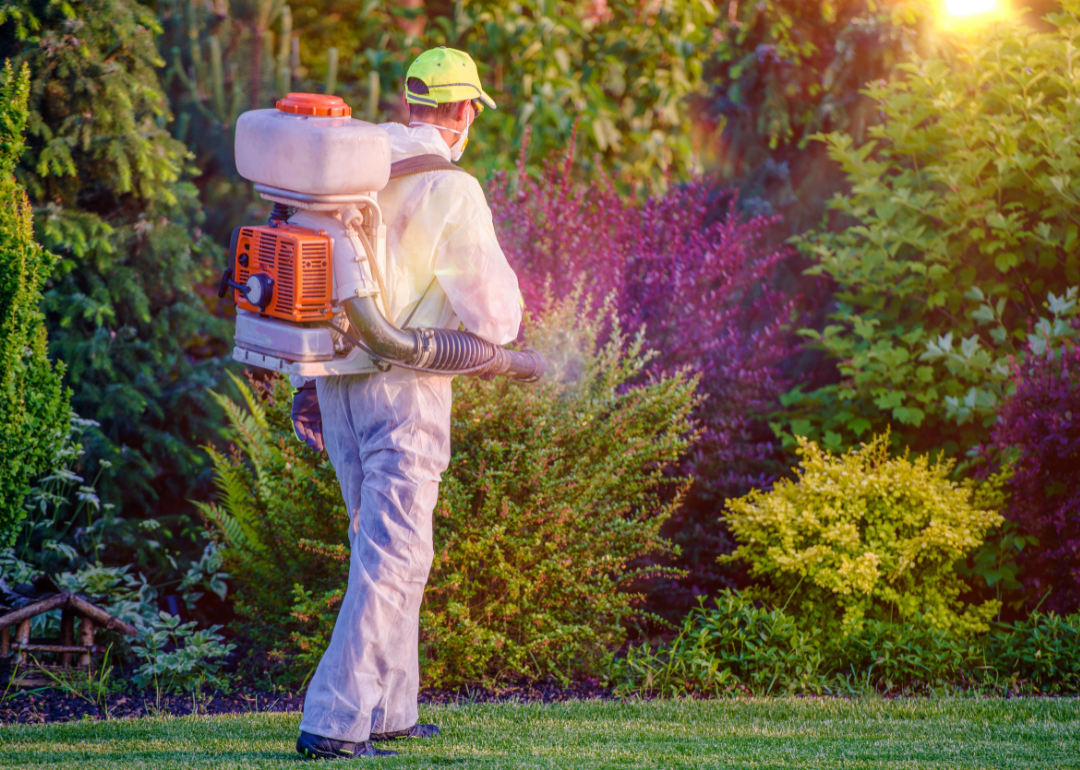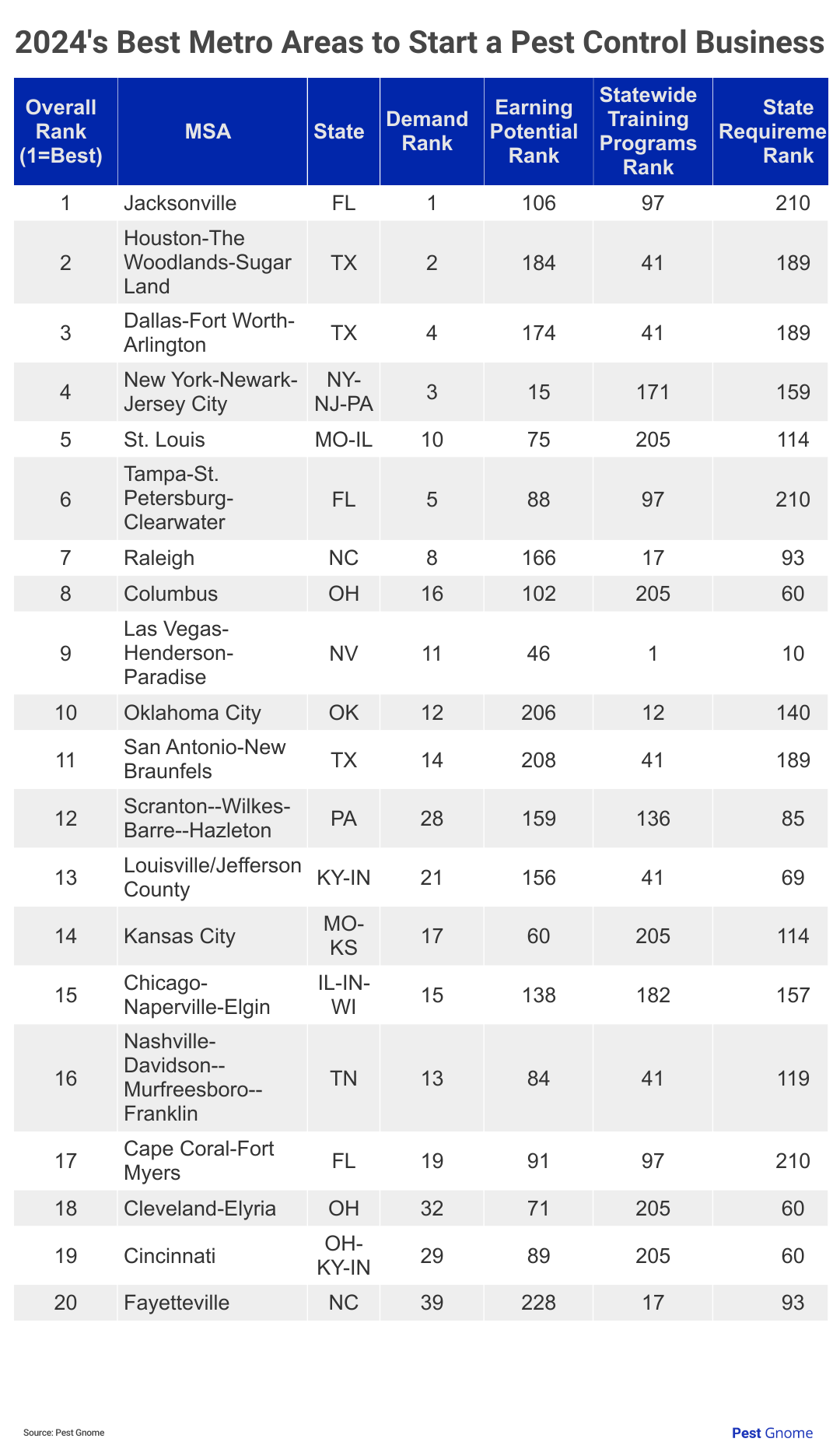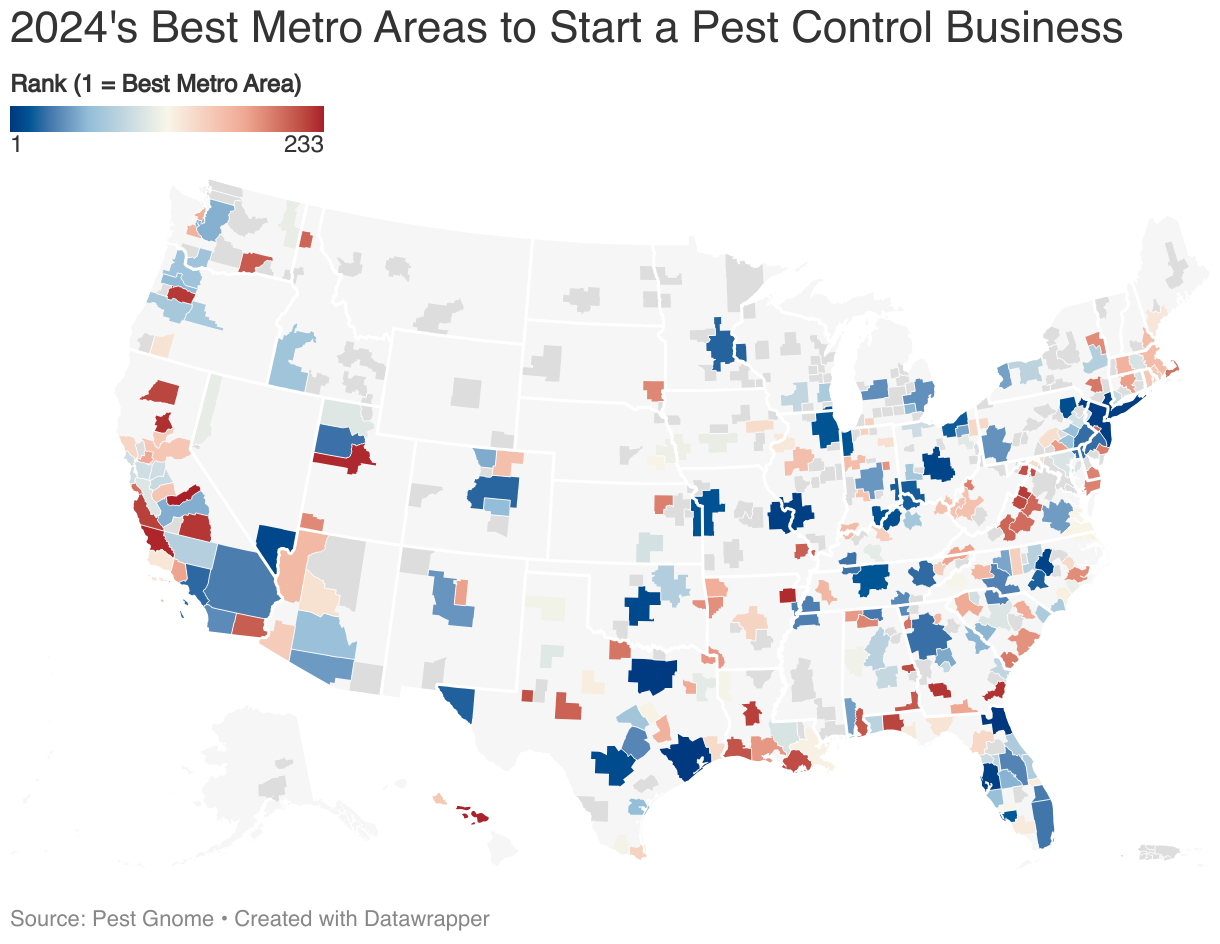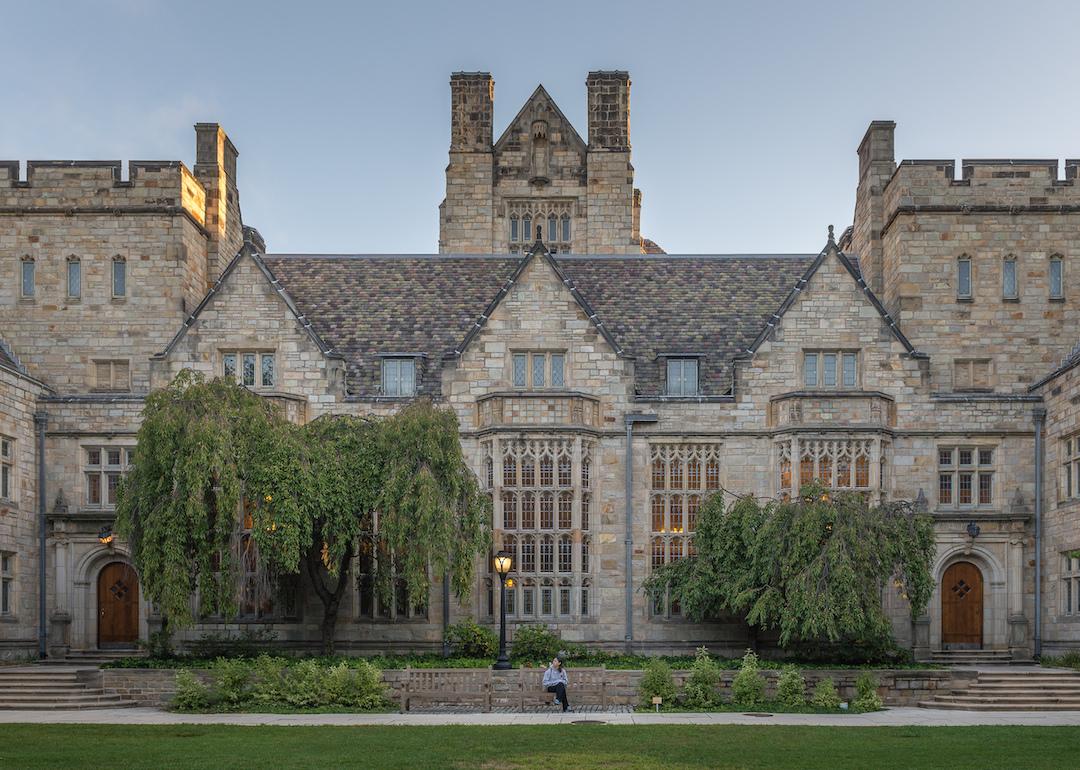
Itching for a new venture? Here are the 20 best US metro areas to start a pest control business in 2024
This story was produced by Pest Gnome and reviewed and distributed by Stacker Media.
Itching for a new venture? Here are the 20 best US metro areas to start a pest control business in 2024
Which U.S. markets are ideal for entrepreneurs looking to launch a pest control venture?
Marking April as National Pest Management Month, Pest Gnome ranked 2024's Best Metro Areas to Start a Pest Control Business.
The ranking compared over 230 of the biggest U.S. metro areas based on 5 categories. More specifically, they looked at the number of common pest species, average hourly pay, and access to pest control training programs, among 10 total metrics.
Explore our ranking below. To learn how we ranked the metro areas, see our methodology.

Metro rankings
Metro areas were ranked by demand for pest control, earning potential, statewide training programs, statewide requirements, and competition.
Top 5 close up
No. 1: Jacksonville, Florida | Overall Score: 72.93
- Average Monthly Google Searches for Local Pest Control: 6,000 | Rank: 1
- Number of Common Pest Species: 28 | Rank: 54
- Average Hourly Wage for Pest Control Workers: $19.77 | Rank: 106
- Number of Statewide Pest Control Training Programs: 18 | Rank: 97
- Cost of Pest Control Business License: $300 | Rank: 182 (tie)
No. 2: Houston-The Woodlands-Sugar Land, Texas | Overall Score: 69.79
- Average Monthly Google Searches for Local Pest Control: 5,800 | Rank: 2
- Number of Common Pest Species: 18 | Rank: 121
- Average Hourly Wage for Pest Control Workers: $17.86 | Rank: 184
- Number of Statewide Pest Control Training Programs: 21 | Rank: 41 (tie)
- Cost of Pest Control Business License: $300 | Rank: 182 (tie)
No. 3: Dallas-Fort Worth-Arlington, Texas | Overall Score: 58.16
- Average Monthly Google Searches for Local Pest Control: 4,180 | Rank: 3
- Number of Common Pest Species: 24 | Rank: 76
- Average Hourly Wage for Pest Control Workers: $18.12 | Rank: 174
- Number of Statewide Pest Control Training Programs: 21| Rank: 41 (tie)
- Cost of Pest Control Business License: $300 | Rank: 182 (tie)
No. 4: New York-Newark-Jersey City, NY-NJ-PA | Overall Score: 57.64
- Average Monthly Google Searches for Local Pest Control: 3,480 | Rank: 4
- Number of Common Pest Species: 89 | Rank: 1
- Average Hourly Wage for Pest Control Workers: $23.85 | Rank: 15
- Number of Statewide Pest Control Training Programs: 10 | Rank: 171
- Cost of Pest Control Business License: $900 | Rank: 228
No. 5: St. Louis, MO-IL | Overall Score: 54.85
- Average Monthly Google Searches for Local Pest Control: 2,880 | Rank: 8
- Number of Common Pest Species: 24 | Rank: 76
- Average Hourly Wage for Pest Control Workers: $20.62 | Rank: 75
- Number of Statewide Pest Control Training Programs: 2 | Rank: 205
- Cost of Pest Control Business License: $65 | Rank: 39

The upshot
Three Texas metros — encompassing Houston (No. 2), Dallas, (No. 3), and San Antonio (No. 11) — finished near the top of our ranking with high Demand for pest control services and numerous training programs for novice technicians. Residents of Jacksonville, Florida (No. 1), buzz up the largest Demand, indicated by local Google searches seeking pest control providers.
Wages are highest among West Coast metros like those encompassing Seattle (No. 54) and California metros San Francisco-Oakland-Hayward (No. 93), and Santa Cruz-Watsonville (No. 201). Pest control workers in these three regions make over $25.76 per hour on average.
Big cities deal with plenty of rats and roaches, but they are already home to numerous companies and technicians for small pest management businesses to compete with. The New York (No. 4) metro has high Earning Potential and Demand with the most common pest species — 89 — but also claims the most competitive pest control industry in our ranking.
Small metros in California and Georgia landed toward the bottom, with Madera, California, in last place. Places like San Luis Obispo-Paso Robles-Arroyo Grande, California (No. 231), and Albany, Georgia (No. 226) have high hourly wages but already have abundant pest control workers per 10,000 households and low Demand overall.
Behind the ranking
First, we determined the factors (metrics) that are most relevant to rank the Best Metro Areas to Start a Pest Control Business. We then assigned a weight to each factor based on its importance and grouped those factors into 5 categories: Demand, Earning Potential, Statewide Training Programs, State Requirements, and Competition.
In the category of Demand, the average monthly Google searches for local pest control providers over the past three years ranged from a low of 60 to a high of 6,000. Earning Potential showed an average hourly wage for pest control workers from a low of $13.56 to a high of $26.35. The number of Statewide Pest Control Training Programs ranged from 1 to 26, and under State Requirements, the cost of a pest control business license came in at a low of $25 to a high of $900. And to round out the categories, Competition ranged from the lowest of 0 to the highest of 929, with pest control jobs per 10,000 households at 1.99 for a low and 35.13 at the highest level.
For each of the 238 biggest U.S. metro areas, data was gathered on each factor from the following sources: Beyond Pesticides, Census Business Builder, Finturf, Google Ads, Individual State Departments of Agriculture, National Pest Management Association, Pest Gnome, U.S. Bureau of Labor Statistics and the U.S. Census Bureau. We eliminated 5 metros lacking sufficient data in a single category, resulting in a final sample size of 233 metros.
Finally, we calculated scores (out of 100 points) for each metro to determine its rank in each factor, each category, and overall. A metro's Overall Score is the average of its scores across all factors and categories. The highest Overall Score ranked "Best" (No. 1) and the lowest "Worst" (No. 233). Note: The "Worst" among individual factors may not be No. 233 due to ties.
Final thoughts
Pests are everywhere — even in the cleanest U.S. cities.
Some cities have big rat, roach, and bed bug problems. Other regions contend with common pests like mosquitoes, spiders, and termites. Wildlife species like groundhogs, rabbits, and armadillos can also pose issues for homeowners.
Because pests will always be around, pest management is effectively a recession-proof industry.
Some homeowners may opt to DIY their pest control, but pesticides can be dangerous when improperly handled. That's why experienced exterminators and regularly scheduled pest control services are so vital to public health and safety.



